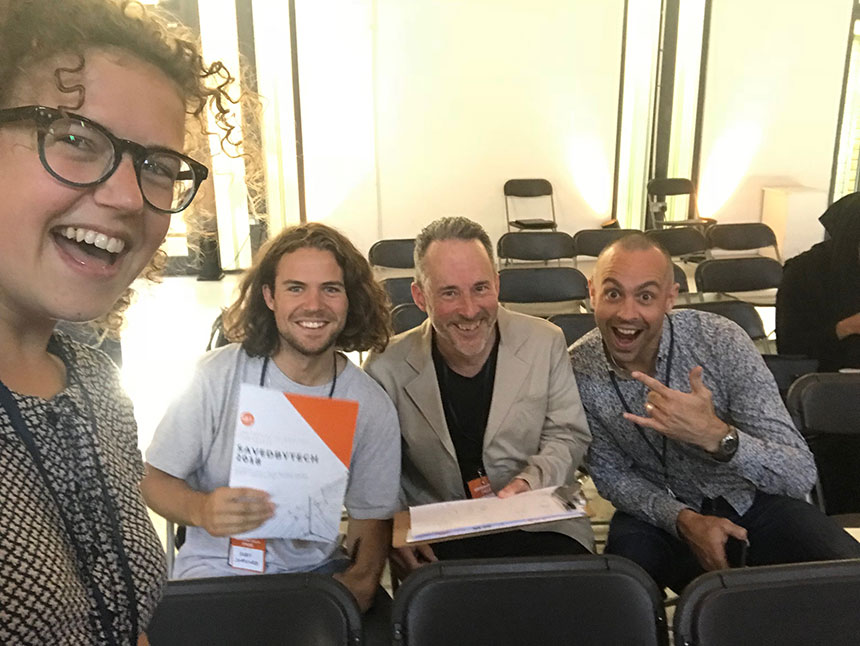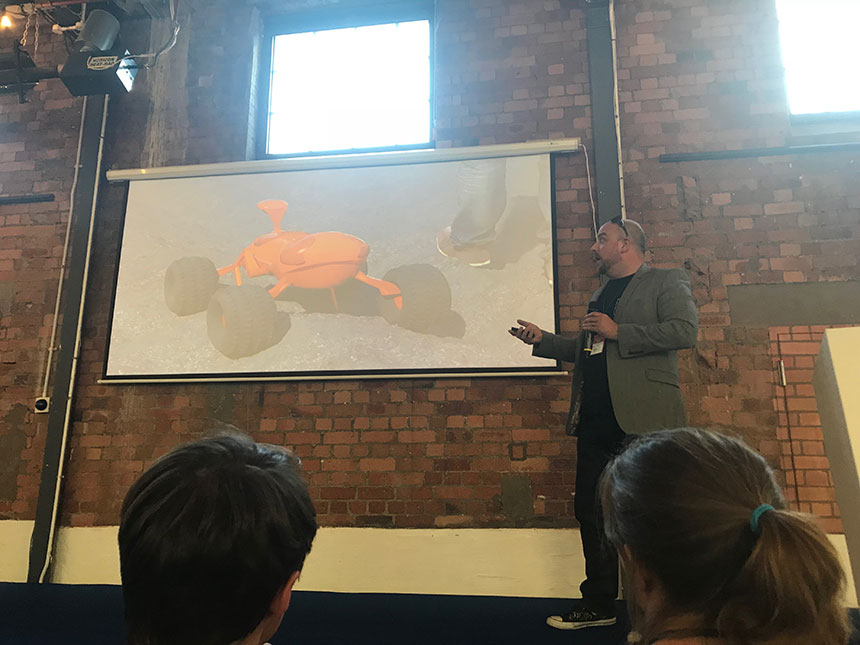Last week, team members from both Simpleweb Studio One and Studio Block headed to the annual sibling conferences Saved By Tech (Day 1) and Blockercon (Day 2) – coined the ‘future technology conference’.
As well as hearing from Tessa, co-founder of food-sharing app OLIO and one of the shining stars of our investment portfolio, Krasina Mileva from Dovu was there to share some insight into how they’re using blockchain to change the face of the transport industry.
Studio Block also had their own help desk set up to unpick attendees’ biggest blockchain related woes and geek out over new ideas.
We weren’t just there to blow the Simpleweb trumpet though, and took plenty away from a conference that closely aligns with both our fearlessness with new technology and our drive for purpose in everything we do.
Charles Radclyffe kicked off the first day of talks with some intense philosophical questions – asking the audience to consider whose responsibility it is to consider the ethical implications of technology and whether a drive to build technology “for the sake of technology” might be taking us backwards rather than forwards.
It wasn’t all doom and gloom though, he touched on his strong belief that, with AI and automation dramatically reducing the number of jobs available across the globe, that universal basic income could be the saviour of human creativity (and sanity) – a view that we have shared when looking at potential future economic business models and how we can place ourselves within the tech ecosystem in the far-flung future.
The speakers opened windows into many other industries too, perhaps less associated with tech, which the team haven’t had much, if any, exposure to. Particularly one startup that’s using the power of AI technology and high-resolution satellite images to gain incredible insight into forest management. Using existing technology, the startup is detecting tree species and health, and monitoring both legal and, more urgently, illegal logging.
In the farming world, another entrepreneur (pictured below) shared with attendees how he was disrupting the industry’s use of machinery with zero-risk ‘farming as a service’ smart robots, both capable of increasing efficiency and reducing the impact of unnecessary resources and polluting pesticides.
We also gained some understanding of the world’s current disjointed weather data system and how speaker and weather geek Erica Sundberg is attempting to decentralise weather data using blockchain technology. Not only will this help individual countries to better predict a rainy day but, more importantly, it could help some of the world’s poorest developing countries to better predict risks presented by bad weather across hugely important industries such as agriculture and save lives with better weather warning systems.
Conversations on the chain
Of course, with half of the conference dedicated to blockchain technology, we got the low-down from Lon, our resident blockchain genius, who manned the Studio Block help desk along with community manager Andy throughout much of the event. For him it was clear to see that the two biggest questions that come up most at Studio Block were what prevailed for the Blockercon community too – that of scalability and consensus.
Lon explains: “Consensus is about deciding which of the many computers working on the blockchain can contribute to it. You don’t want a ‘naughty computer’ doing it all as they can then make changes for their own aims, so how do you choose the ‘well behaved’ computers? Scalability is about how to cope when the blockchain becomes massive and sluggish – and how you can do things differently to make it all happen faster.”
That said, the presence of the help desk led to some interesting conversations. “The topic of energy consumption of the Bitcoin blockchain came up a few times” Lon tells us. “The Bitcoin blockchain does consensus in a very energy hungry way. As a result all the computers involved in it use up electricity on an industrial scale, or even a national scale.
“This got me wondering about consumption and, sure, the Bitcoin blockchain uses energy if we compare it to nothing at all, but what about if we compare it to a real bank? A global financial institution has acres of offices, thousands of commuters, vast data centres, international flights and telecoms. How does the global energy use of a big bank stack up against the Bitcoin blockchain?
“We also got chatting to a lawyer about smart contracts. These are contracts that do things without anybody being able to stop it. For example, ‘if this digital asset is transferred to this account before 24 June 2018, then transfer this amount of money to this account’.
“We were wondering if there has ever been anything like this before and he pointed out that ‘mechanical smart contracts’ have been around for quite a while, in the form of vending machines. The machine embodies the idea that you put some cash in and something comes out, without anybody being involved. It embodies a contract, and there is a lot of law already in existence to cover this.”
So ultimately, at least for us, technology is a saviour. We rejoice in the startups with drive and purpose – like OLIO – and the entrepreneurs who are passionately working to do good. For blockchain, the potential is only just starting to be realised and is sparking intense and necessary debates that past technology has skirted around – as well as igniting fire in the bellies of the next generation of entrepreneurs. And we’re so excited to be a part of it all.
If you’d like to discuss your startup or project, get in touch with Simpleweb today.






